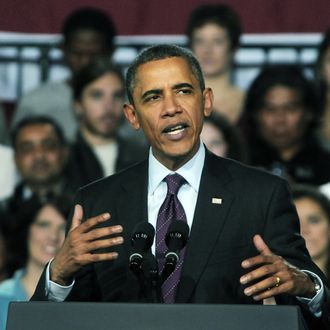
Various fiscal scolds have been scolding President Obama for failing to use his mind-control powers to force Republicans to accept a tax hike. Michael Bloomberg sadly attributes the failure of the supercommittee to agree on reducing the deficit to a failure of “leadership.” (Say, are there any leaders we could turn to? Perhaps somebody with a large bank account and a penchant for catering to the social and economic predilections of elites?)
The notion that Obama’s “leadership” could have persuaded Republicans to accept a tax increase seems strange. Republicans, I have noticed, tend not to like Obama very much. His endorsement does not carry a great deal of weight with them. That was why the administration stayed in the background when Erskine Bowles and Alan Simpson developed their deficit plan.
When deficit scolds complained that he failed to embrace them openly, Obama tried a different tack when the next bipartisan deficit commission came around. That was the Senate’s “Gang of Six.” Obama decided to openly tout the plan. Did that work? No, it did not. A Republican aide, probably accurately, blamed Obama’s endorsement for the kiss of death. (“The President killed any chance of its success by 1) embracing it. 2) hailing the fact that it increases taxes. 3) Saying it mirrors his own plan.”)
Okay, so if Obama openly endorses a bipartisan plan, he’s killing it. And if he keeps his distance, he’s also killing it. What if he tries to directly negotiate a deficit reduction plan behind closes doors? Well, Obama did that, too, this last summer. Republicans opposed it as well.
It is not terribly surprising that deficit scolds are sadly blaming both sides for failing to reduce the deficit, because this is what deficit scolds do. If they could not sadly blame both sides for failing to come together to agree to reduce the deficit, they would cease to exist. Since Democrats are openly offering to cut entitlement spending, and Republicans are openly refusing to increase taxes, some reason must be produced to spread the blame equally. “Leadership” is a suitably amorphous accusation. Like accusing the president of possessing evil spirits, it is a damning charge that cannot be disproved by verifiable facts.
What is at least somewhat remarkable is that Republicans have taken up this talking point as well. Today’s The Wall Street Journal editorial page shakes its head that Obama should have “honored the findings of his own Bowles–Simpson deficit commission.” A companion op-ed by Representative Jeb Hensarling, a member of the supercommittee, laments that Democrats rejected “the approach to tax reform used by recent bipartisan deficit reduction efforts such as the Bowles–Simpson fiscal commission.” That would be the same Bowles–Simpson plan that the Journal editorial page opposed and that Hensarling voted against.
The Republican Party has a two-decade record of perfect anti-tax absolutism. Democrats have implored them over and over and over again to accept some kind of agreement to trade entitlement cuts for higher revenues. They have offered the deal in every conceivable fashion. The answer is always no. Asking once again, in a slightly different or more urgent way, will not change the answer. This is not Green Eggs And Ham.






























